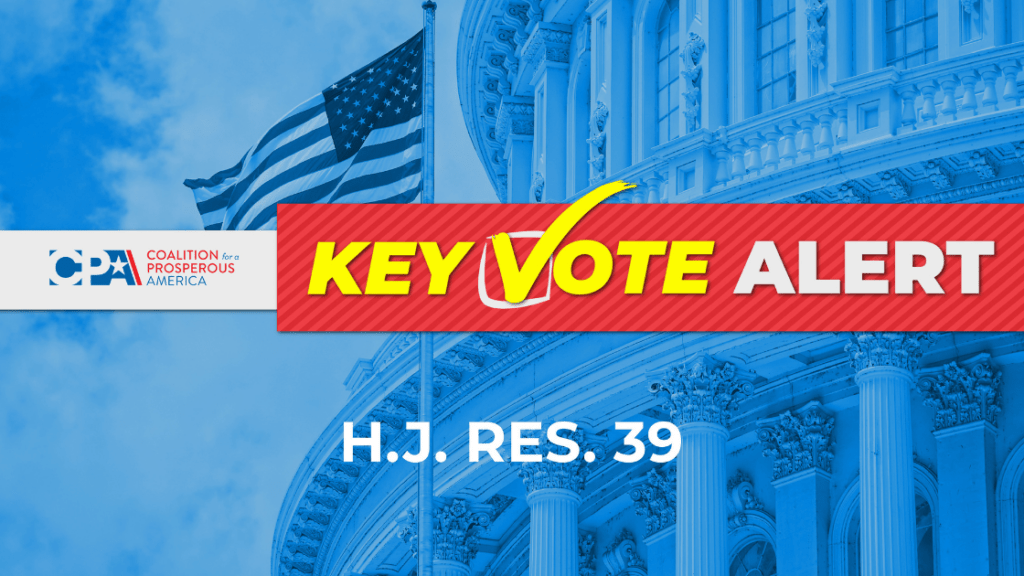Human Rights Groups and Domestic Manufacturers Support the Bipartisan Effort
WASHINGTON — The Coalition for a Prosperous America (CPA) today announced that it will key vote in support of the bipartisan resolution of disapproval (H.J. Res. 39) under the Congressional Review Act (CRA) to repeal the Biden administration’s Solar Emergency Declaration. This harmful rule, in effect until June 2024, protects Chinese solar manufacturers even though the U.S. Commerce Department recently determined, after an in-depth investigation, that they are illegally evading tariffs. Last week, Democrats and Republicans on the House Ways and Means Committee supported the solar CRA, which moved it to the House floor.
- Read CPA’s memo on why lawmakers should support the solar CRA (H.J. Res. 39) HERE.
A new poll of likely voters, conducted by Morning Consult for the Coalition for a Prosperous America (CPA), shows 80% of likely voters, including 76% of Democrats and 77% of Independents, are concerned that the Solar Emergency Declaration protects Chinese solar manufacturers who are illegally avoiding tariffs. Additionally, a significant majority (62%) of likely voters, including 61% of Democrats and 55% of Independents, support Congress passing the bipartisan Solar CRA.
The “Tariff Suspension” is a permanent giveaway to China, not a “temporary bridge”
Opponents have falsely claimed it is necessary to turn a blind eye to illegal Chinese trade activity and suspend tariffs because a “temporary bridge” is needed to keep up with demand. In reality, the administration’s Solar Emergency Declaration is a “get out of jail free card” for China forever. Commerce’s preliminary determination allows China to avoid future tariffs by constructing wafer facilities outside of China—something the Chinese are doing right now. It takes roughly 18 months to build a wafer facility, which is why the Biden administration chose to suspend tariffs for two years.
- Dive Deeper: Read CPA’s Myths and Facts HERE.
Opponents of the solar CRA are spreading false claims.
Opponents of the solar CRA, led by the Solar Energy Industries Association (SEIA) that is funded by and represents Chinese solar manufacturers, have spread a number of falsehoods about the bipartisan effort. They claim it would increase prices, freeze the domestic solar industry, and cost American jobs.
The facts say otherwise.
Tariffs have been imposed on Chinese solar imports for more than a decade without increasing the cost of solar or slowing deployment. Even SEIA acknowledges “solar energy in the United States is booming” and that “growth in solar is led by falling prices.”
SEIA also admits that supply chain constraints have resulted in price increases from “challenges stemming from the global pandemic and trade instability.” This has been the case in countless other industries. Additionally, SEIA notes that the Uyghur Forced Labor Prevention Act (UFLPA) has “led to detained solar shipments, insufficient module supply and continued project delays.”
- Read why SEIA’s pricing argument is false HERE.
Importing Chinese solar supports slave labor and increased coal production.
U.S. Customs officials have seized $1.3 billion worth of imports since UFLPA went into effect last June, the majority of which were Chinese-made solar panels from Southeast Asia. Additionally, CNBC reported that officials at the Port of New York and New Jersey, the largest port on the East Coast, seized $60 million worth of forced labor goods, including $20 million worth of solar panels.
Human rights groups like the Uyghur Human Rights Project support the solar CRA, arguing “it is unconscionable to believe that the U.S. should build a clean-energy future that relies on products made under the combination of dirty coal plants and China’s genocidal forced-labor inputs.”
A recent study by Cornell University confirms that boosting domestic solar manufacturing would cut greenhouse gas emissions by 30%. Importing more Chinese solar contributes to Beijing’s record construction of coal-fired power plants that directly support its solar industry. As NBC recently reported, “China approved the highest number of new coal-fired plants since 2015 last year,” including “106 gigawatts of new coal power capacity in 2022, four times higher than a year earlier and the equivalent of 100 large-fired power plants.”













